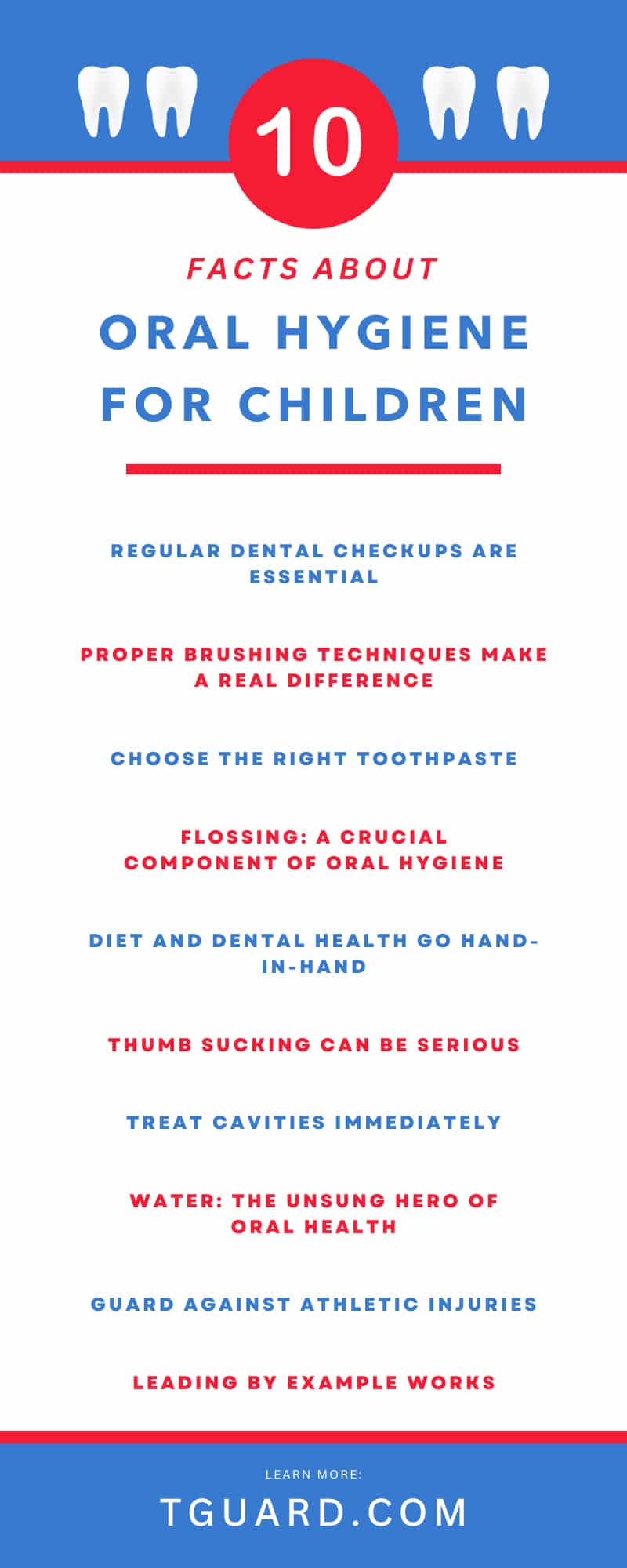As a parent, keeping your child healthy is a top priority. One essential aspect of their health is maintaining good oral hygiene. Read through these 10 facts about oral hygiene for children that will help you ensure your child has a bright, healthy, cavity-free smile!
Regular Dental Checkups Are Essential
The American Academy of Pediatric Dentistry (AAPD) recommends scheduling your child’s first dental visit when their first tooth comes in or by their first birthday—whichever occurs first. After this initial visit, your child should see the dentist every six months for a checkup and cleaning. Regular checkups help detect early signs of dental issues and allow the dentist to provide preventive care, which is key to maintaining good oral health.
Proper Brushing Techniques Make a Real Difference
Teaching your child to use the correct brushing technique is essential to remove plaque and prevent cavities effectively. For toddlers and preschoolers, use a small, pea-sized amount of fluoride toothpaste on a soft-bristled toothbrush. Gently brush their teeth using small, circular motions, and make sure to reach all surfaces, including the tongue. Remember to encourage your child to spit out the toothpaste, as swallowing large amounts of fluoride can lead to dental fluorosis, a permanent discoloration of the teeth.
Choose the Right Toothpaste
Fluoride is effective in helping to prevent cavities, but selecting toothpaste specifically designed for children is crucial. These specialized products usually contain lower levels of the mineral, reducing the risk of dental fluorosis. Look for toothpaste brands that have the ADA Seal of Acceptance, ensuring their safety and effectiveness.
Flossing: A Crucial Component of Oral Hygiene
Flossing helps remove food particles and plaque from between the teeth, where the toothbrush may not reach. Parents should begin flossing their child’s teeth as soon as two teeth touch each other. Introduce flossing as a regular part of your child’s oral hygiene routine, making it a habit they will carry into adulthood.
Diet and Dental Health Go Hand-in-Hand
Your child’s diet significantly impacts their dental health. Consuming foods high in sugar and carbohydrates contributes to plaque formation, increasing the risk of cavities. Make sure to provide your child with a balanced diet that emphasizes fresh, whole ingredients over highly processed foods and minimizes sugary snacks.
Thumb Sucking Can Be Serious
Prolonged thumb sucking is an oral health issue. The consequences of thumb-sucking can be severe. While thumb-sucking is common in infants and young children, persistent thumb-sucking beyond toddlerhood can lead to dental deformation, speech impediments, infections, and even bullying from peers.
Parents can gradually wean their child off thumb-sucking by providing alternatives such as a stuffed animal or blanket to hold onto instead. Positive reinforcement for not thumb-sucking can also be effective, alongside addressing any underlying stress or anxiety that may be causing the behavior. If the behavior persists past the age of five, consulting with a professional and using a device like the TGuard AeroThumb to wean the child off the habit may be necessary.
Treat Cavities Immediately
Over 13 percent of children have untreated cavities, according to the Centers for Disease Control. Treating children’s cavities is crucial when it comes to good oral hygiene. If left untreated, cavities can quickly progress and lead to tooth pain, abscesses, and other dental problems.
In addition to causing physical discomfort, untreated cavities can affect a child’s overall health and well-being. Children with untreated cavities may experience difficulty eating, sleeping, and even speaking. This issue can negatively impact their nutrition, energy levels, and social interactions.
Furthermore, untreated cavities can lead to more severe dental problems as the decay spreads to other teeth. Therefore, it’s essential to seek professional dental care immediately if you notice any signs of cavities in your child. A dentist can provide the necessary treatment to prevent further damage and promote healthy tooth growth and development.
Water: The Unsung Hero of Oral Health
Staying hydrated is essential for overall health, but it also plays a vital role in oral health. Drinking water helps wash away food particles and acids produced by bacteria in the mouth. Good hydration also promotes the production of saliva, which aids in neutralizing acid and repairing weak spots in tooth enamel. While it may not directly target tooth decay, drinking water can play a significant role in a child’s oral health.
Guard Against Athletic Injuries
Many dental injuries can occur during sports activities, making it essential for parents to take proper precautions to protect their children’s teeth. A well-fitting mouthguard can help absorb impact and prevent trauma to the mouth and jaw, reducing the risk of serious dental injuries.
Children who are old enough to play contact sports such as football, basketball, and soccer should wear mouthguards during practice and games. Dentists and orthodontists also recommend mouthguards for non-contact sports such as skating, gymnastics, and biking, where falls and collisions can still result in dental injuries. By prioritizing the use of mouthguards, parents can help protect their children’s teeth and promote healthy oral hygiene practices.
Leading by Example Works
Children learn by observation. Modeling good oral hygiene will make an impact on your children. Make brushing and flossing a part of your daily routine, and bring healthy eating habits to family meals.
Good dental health is vital to your child’s overall health and well-being. Regular checkups, proper brushing techniques, flossing, a balanced diet, and avoiding sugary snacks are all key components of healthy oral hygiene practices.
Helping your child lose their dependence on pacifiers and thumb-sucking as ways to comfort themselves is important for their oral health and social development. Employ a variety of strategies, from positive reinforcement and praise to gentle devices like the TGuard AeroThumb, to help your children break habits that can impair their oral health.
There are many factors that can affect a child’s oral health over the years, from unwanted habits to accidental tooth damage. Learning 10 facts about oral hygiene for children will set you well on your way to ensuring your child has a bright, healthy, and cavity-free smile for years to come.




